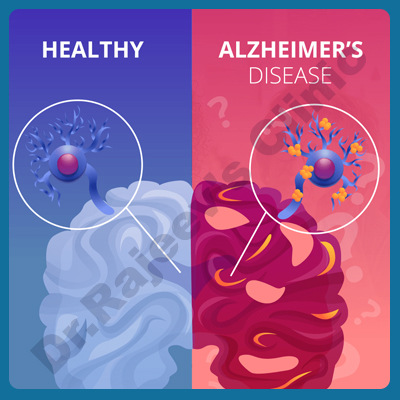

Alzheimer's disease (AD) is a slowly progressive disease of the brain that is characterized by impairment of memory and eventually by disturbances in reasoning, planning, language, and perception. Many scientists believe that Alzheimer's disease results from an increase in the production or accumulation of a specific protein (beta-amyloid protein) in the brain that leads to nerve cell death.
The likelihood of having Alzheimer's disease increases substantially after the age of 70 and may affect around 50% of persons over the age of 85.
The main risk factor for Alzheimer's disease is increased age. As a population ages, the frequency of Alzheimer's disease continues to increase. Ten percent of people over 65 years of age and 50% of those over 85 years of age have Alzheimer's disease. Unless new treatments are developed to decrease the likelihood of developing Alzheimer's disease, the number of individuals with Alzheimer's disease in the United States is expected to be 14 million by the year 2050.
There are also genetic risk factors for Alzheimer's disease. Most patients develop Alzheimer's disease after age 70. However, 2%-5% of patients develop the disease in the fourth or fifth decade of life (40s or 50s). At least half of these early onset patients have inherited gene mutations associated with their Alzheimer's disease. Moreover, the children of a patient with early onset Alzheimer's disease who has one of these gene mutations has a 50% risk of developing Alzheimer's disease.
There is also a genetic risk for late onset cases. A relatively common form of a gene located on chromosome 19 is associated with late onset Alzheimer's disease. In the majority of Alzheimer's disease cases, however, no specific genetic risks have yet been identified.
Other risk factors for Alzheimer's disease include high blood pressure(hypertension), coronary artery disease, diabetes, and possibly elevated blood cholesterol. Individuals who have completed less than eight years of education also have an increased risk for Alzheimer's disease. These factors increase the risk of Alzheimer's disease, but by no means do they mean that Alzheimer's disease is inevitable in persons with these factors. All patients with down syndrome will develop the brain changes of Alzheimer's disease by 40 years of age. This fact was also a clue to the "amyloid hypothesis of Alzheimer's disease"
Changes develop in the brain : Research about these structures has provided clues about why nerve cells die, but scientists have not determined exactly why these changes develop. In short, no one yet knows exactly what causes Alzheimer's disease. Most researchers agree that the cause may be a complex set of factors. Though Alzheimer's disease affects individuals in 40s and 50s, studies have shown that the greatest known risk for developing Alzheimer's is increasing age. As many as 2-4 % of all people of 65 years of age and older have Alzheimer's. As many as 20 % (or more) of population over 85 years age have the AD. A family history of the disease is another known risk. Having a parent or sibling with the disease increases an individual's chances of developing Alzheimer's. Many mysterious diseases have provided interesting clues through genetic studies. Scientists have identified certain genes, which are very strongly related to Alzheimer's.

The clinical diagnosis of Alzheimer's can be made with an accuracy up to 90% based on these symptoms and the results of a collection of test
ALUMINA : Useful for Alzehiemer's disease to elderly people with marked forgetfulness.Given when memory is weak or completely lost and the person’s consciousness of reality and judgment is disturbed. Recommended when person is confused as to personal identity and when he sees or states something , he has the feeling as though another person had said or seen or as he was placed in another person and could see only then.Also useful for alternating moods, and shows absent mindedness.There is mistakes in writing and speaking.
CANNABIS INDICA : Excellent medicine for Alzheimer’s disease with sudden loss of memory with absent minded, forgetful, cannot finish a sentence . There is sudden loss of speech, begins a sentence but cannot finish it. There is sudden loss of thoughts with great inability to recall ideas even after exerting the mind to do so. There is misconception of time and space.Mostly recommended when the person feels that time passes too long, seconds seem ages, a few miles an immense distance .
GINKGO BILOBA : Useful for Alzheimer’s disease with memory, senility and mental dullness problm.Given when person is mentally weak and exhausted with poor concentration. There is loss of memory and inability to solve mental task. Absent minded and forgetful.
AURUM METALLICUM : Very useful for Alzheimer’s disease with severe acute depression. There is hopelessness and grief with disgust of life and thoughts of suicide.Given when the person talks of committing suicide , but there is great fear of death.
RL- 43 :